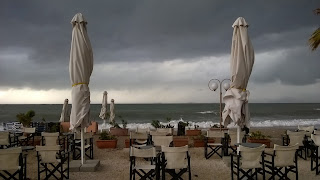In, out, in, out, shake it all about
I have two dominant anxieties about the EU referendum.
The first is encapsulated in the comic strip character Mayor
Johnson. Clever, well-educated and
dangerous, Johnson has grafted a public persona of bumbling haplessness onto a
private personality modelled on his hero, Winston Churchill, to whom he bears a striking and steadily increasing physical resemblance.
Great though Churchill undoubtedly was – as Johnson’s own
biography of the man attests – he and his myth are inextricably linked with the
narrative of Empire. To recall Churchill
is to recall the War, and Potsdam, and an England that still, just, ruled the
waves. To cite Churchill as an
inspiration is to imagine that a mighty nation still exists, a nation soon to
rouse from its slumbers and capable of once again shaping the world. To imagine such a nation is to deny the challenges
confronting the world of the twenty first century, and to deny, too, the realities
of the past fifty or sixty years.
The denial is not Johnson’s alone, of course. Every day, and especially every Sunday, our
televisions positively groan with export-oriented costume dramas, dramatic
re-creations of re-factualised pasts and pastiche documentaries about long-dead
kings, queens, murderers and cults.
Seemingly terrified by an uncertain and bewildering future, huge numbers
of Britons appear to take refuge in the re-imagined past, a past of certainties
and authenticity, of simplicity and honour, of power and glory. Once upon a time we were Great; and, when we
were, everything else was great too. We
all want a great future – so let’s get back to being Great again.
Johnson both physically and figuratively embodies this
belief. (Trump is the American version.)
He is the manifestation of a myth. The
mythological term upon which he – and others – rely is ‘sovereignty’. And my anxiety is grounded in the potential
power of that myth.
In the bright light of the facts, a few densely populated
islands just off the north western seaboard of the continental landmass known
as Europe are about to make a decision with fifty-year consequences. The only – the only – rational thing to do is
to remain intimate with our friends and neighbours. To cast ourselves adrift – to have
sovereignty over our own little boat as the storms grow ever fiercer – would be
folly of an extreme kind.
And yet, and yet, it might actually happen, through the
power of myth.
My second anxiety, reinforcing the first, comes from my
experience a dozen or so years ago when I facilitated a series of discussions
about whether the UK should or should not join the Euro.
London First, a business-led lobbying and campaigning group, wanted to
explore whether the Euro would be good or bad for London. I suggested that there were four possibilities:
- the UK joins the Euro, and it’s bad for London
- the UK joins the Euro, and it’s good for London
- the UK doesn’t join the Euro, and it’s bad for London
- the UK doesn’t’ join the Euro, and it’s good for London
As a half-decent economist, I was able to construct an
argument in support of each of these positions.
Why not, I suggested, hold four ‘business breakfasts’. I’ll pitch one argument – one scenario – to each breakfast. Four breakfasts, four scenarios. We'll prompt debate and discussion,
which will in turn help businesses, and London First, decide on what position to adopt.
And so it came to pass.
At each breakfast, a group of a dozen or so business folk, all pretty
senior, all from major London-based businesses, all with responsibility for
dealing with the issues associated with the Euro. At each breakfast, I gave an opening
presentation, setting out just one of the four possibilities – in, good; in, bad; out good, out bad.
My expectation had been that debate and discussion at each
breakfast would reveal the various pros and cons, would elicit insights and
perspectives from the various participants and would bring into the light the
facts and figures upon which a rational decision could be based.
In fact what happened was that each and every meeting ended
up agreeing with my initial presentation. Irrespective of which scenario it was. What became clear was that the very people who one might most have
supposed would have some useful insights, perspectives, facts and figures in
fact had no idea at all. What became
clear was that a single persuasive argument – a single story – could fill the
vacuum. It didn’t actually matter what
the story was, so long as it was a good one.
And thus my second anxiety.
Most people, I suspect, have little or no idea whether staying in the EU is better than getting out, or vice versa. On top of that, the
people who ought to have the facts and figures probably don’t know either. In such a vacuum, what matters is – the story,
the myth. And who tells it. If a
comic-book character – quite literally, a person from a story – tells an
easy-to-understand story to millions of people for whom such stories are
already central to how they cope with the vicissitudes of day-to-day life, then
the myth really might win.
I can hardly bear to imagine it. So much so, I’m off to consult with the goblins and the leprechauns to see if they’ve got any bright ideas.
[If there's a photo down here it was added
August 2017 as part of blog refresh. Photo is either mine or is linked to
where I found it. Make of either what you will.]



Comments